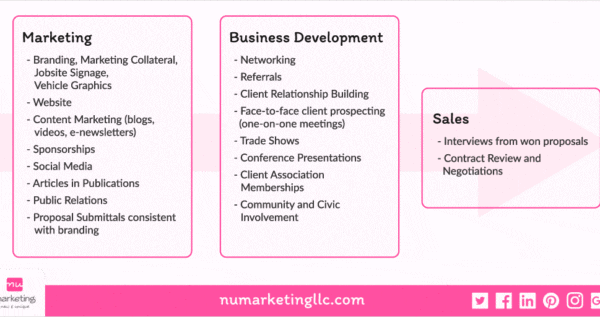
Strategic Marketing Plans (Updated 2021)
In the design and building industry, strategies are used for designing, engineering, and constructing projects. It should be no different for your company’s marketing and business development teams. A marketing strategy is important to you, your team, and your company. It’s important part of growth and companies who invest in strategic marketing plans have higher profits.
Strategy is planning and brainstorming. Strategy helps you get all your ideas out on paper and analyze which ones are going to get you the best results and get you to where you want to go. It takes expertise, time and commitment to put together and implement a strategic marketing plan.
There are four steps for putting together a marketing strategy:
- Commitment and buy-in to the process
- Implementation of the marketing strategy
- Team accountability
- Celebrating success
Commitment
Your first step is determining who is going to be part of the strategic marketing plan both writing it and implementing it. It may be different groups of people based on the size of your firm. This usually involves marketers, business developers, principals, project managers, studio leads, and/or lead engineers. These people are involved with bring in or retaining clients and projects. You must get commitment and buy-in from these people, so the marketing strategy will be implemented and drive the success of the firm.
Having an outside marketing consultant may also be helpful for your firm if you aren’t familiar with strategic marketing. These marketing consultants help generate ideas, determine goals, and keep the team accountable. Find one that knows the industry and someone you are comfortable working with for an extended period of time.
Once you have your marketing strategy team assembled, schedule a brainstorming session. A good time to schedule this brainstorming session is before budgets are assembled (September or October, if your company is on a fiscal budget year), so the team knows the budget they have to work with toward the strategic marketing plan. Without a budget, it’s very hard to put a strategic marketing plan together. Your plan will look very different if you have $50,000 versus $1,000,000 to spend on marketing and business development efforts. (The Marketing Budget is very important in your strategy.)
You should have no more than 15 people in these brainstorming meetings. If you have a large organization (500+ employees) or multiple locations, then you could set up focus groups and then have a champion of each focus group report back to the strategic marketing group. Make sure you have a scribe to take notes or record the strategy sessions, so you capture everything discussed. Having this information easily available will be helpful when you actually write the plan to refer back to what everyone in the brainstorming session said.
As strategies are determined, tactics or goals should be determined. You should have 2-5 strategies within your marketing and business development plan, and then have 2-10 tactics or goals within each strategy. Writing them down is critical, so you can measure your success and make sure your tactical decisions direct you toward your strategies. It’s your roadmap to success.
A strategy would be: We want to do more work with mechanical engineers. Your goals would be to 1) Make four presentations (list the titles and presenters) throughout the year to six different (list the firms) engineering firms. 2) Physically visit each engineering firm once a month (presentations can count as a visit) giving them project drawings, having a meeting, taking them to lunch, or some other business development activity. The result would be to generate $1 million in sales from those two goals.
Tactics that would align with this strategy would include presentation content, blog content pertaining to the presentation, email campaigns targeted to the engineers, posts on social media targeting mechanical engineers, just to name a few. Tactics are more like projects or steps that are going to get you to your overall goal.
If you struggle to know what a strategic marketing plan looks like, here are some topics that are a good starting point for discussing.
- Complete a SWOT Analysis (Strengths, Weaknesses, Opportunities, and Threats)
- Ask your customers what they want or need. They usually have great ideas on improving your company and many of them aren’t afraid to make suggestions. (Client Surveys are a great way to capture these suggestions and you can learn more about the importance of client perception surveys.)
- Discuss what markets/industries you want to continue to serve.
- Discuss what new markets/industries you want to start serving.
- Always ask why? Find out what the reason is for the strategy. It may not be because you disagree but a “why” needs to be justified.
- Discuss how and where you are going to market yourselves toward this strategy.
- Discuss if your strategy requires new or update software (Customer Relationship Management (CRM), graphic design, etc.)
- Discuss when you make these changes, what processes or procedures are going to need to be changed or modified.
Remember some of the activities from the previous years. These might include the following:
- Proposals
- Customer Appreciation Events
- Interview Presentations
- Sponsorships
- Customer Feedback (Client Perception Surveys)
- Promotional Products (swag)
- Trade Shows (whether exhibiting or presenting educational content)
- Business Development Activities
- Marketing Collateral (brochures, notecards, presentation deck, sales folders, trade show banners, etc.)
- Public Relations
- Website
- Social Media
- Digital Advertising
- Traditional Advertising (print)
The marketing plan which includes a budget is instrumental in your success. Ask your accounting department for marketing and business development budgets from the previous year(s). If your accounting department lumps “marketing” into one category, you’ll want to determine your own method of tracking expenses. Identify successes and failures for the above activities. (AEC Marketing Budgets are a necessary tool for your marketing plan.)
Implementation
Communicating and implementing the plan is essential in attaining your goals. Teamwork and buy-in are imperative to the success of a strategic marketing plan. This is where writing down company marketing strategies and goals will help with implementing all your great ideas. Consistent communication with the strategic marketing team requires clear and concise expectations. Let employees know how they will impact the marketing strategy and how they can be part it. When employees understand how their day-to-day roles play into the overall marketing strategy, they see purpose in their position as it relates to marketing and business development for your company. Most employees want to do the best they can at their job, but the marketing or business development leader must give them directions. These directions, however, are meant to be a guide, not an absolute. Multiple forms of communication are necessary, not just in a time of crisis, but throughout the strategic marketing process.
Accountability
Accountability is also an important component to the strategic marketing plan. Having a scorecard allows the team to see where they are going and where they have been. It also allows the team to see what tactics still need to be implemented and who is responsible for completing those goals.
Create a scorecard that will work for your team. This can be as easy as using a spreadsheet or utilizing your Customer Relationship Management System (CRM). You must measure your goals, so you know if you reach them and in some cases why you don’t reach them. Remember, if you don’t write it down, it’s not a goal. It helps you remember and stay accountable to your principals and yourself. Keeping these goals visible on a daily basis will keep you focused on the strategies at hand.
Celebration
Once the team accomplishes the goals, you must celebrate as a team. Celebration is important because it recognizes the hard work the team has contributed to reaching the goals. It gives employees pride in their work and motivates them to continue working hard. Recognition is one of the most effective ways to retain your current employees and is an underutilized tools. As a good leader, you must celebrate the team’s achievements. Saying “Thank You” goes a long way.
Here are some additional ideas to celebrate wins:
- Company Picnic
- Encourage and Support Professional Development
- Sports Outing/Event
- Give Them Time Off
- Teambuilding Activities
- Company Logoed Apparel or Office Supplies
- Take Them Out to Lunch
- TELL THEM THANK YOU (most employees just want to know they are appreciated for their contribution by being told genuinely they are appreciated)
Once you celebrate, raise the bar a little higher. Expect more from people. Consider it the next challenge. Do something every day that scares you a little bit. It will make you a better person and a better leader.
Take Action!
Committing, implementing, being held accountable, and celebrating are the four ways to effectively lead your team through the strategic marketing plan and goals. You must be ready to take your team through this process, because it will grow your company in more ways than you realize. It’s something you should start right now.
Contact Us Today
Don’t want to take on this yourself. nu marketing consultants architectural, engineering, and construction businesses through their strategic marketing plans to help build business and increase profits. nu marketing offers
- Strategic Marketing and Business Development Plans
- Client Perception Surveys
- Corporate Event Planning
- Internal Marketing (Retaining Great Employees)
- Social Media Strategies
- Trade Show and Conference Tactics
- Communication Techniques
Communication among the team is vital to the success of a company and having specific, measurable goals, both company-wide and individual, is crucial. Contact us today at lindsay@numarketingllc.com or 316-680-3097. We’d love to sit down with you and discuss your marketing strategies.
This blog was originally posted April 2016 and has been updated to reflect current market conditions.



